Abstract
Site-directed immunization was employed to identify sites on the envelope glycoprotein gp120 for antibody-mediated neutralization of human immunodeficiency virus type 1 (HIV-1). Antisera were raised in monkeys (Macaca fascicularis) against a series of 40 overlapping synthetic peptides covering the entire amino acid sequence of gp120 from the HTLV-IIIB strain of HIV-1. Immune sera against 12 of these peptides were reactive with gp120 by immunoblotting analysis, and antisera raised against 5 peptides, corresponding to amino acids (aa) 152-176, 193-218, 206-230, 248-269, and 307-330, were highly efficient in neutralizing HIV-1 (HTLV-IIIB) infectivity in vitro. Admixture of individual neutralizing anti-peptide monkey sera resulted in increment in neutralizing antibody titer. Antisera with reactivity to the relatively conserved regions defined by aa 152-176, 193-230, and 248-269 also neutralized to different extents the infectivity of the five Swedish clinical isolates of HIV-1 tested. Only a few HIV-1-infected people were found to make antibodies to these three conserved domains of gp120 as judged by ELISA using synthetic peptides as antigens. Three of the peptides (aa 152-176, 248-269, and 307-330) that induced neutralization antibodies also induced interleukin 2 production and lymphocyte proliferation when added to cultures of peripheral blood mononuclear cells from monkeys immunized with the corresponding peptides, indicating that these domains accommodate T-cell recognition sites. The results have obvious implications for the rational design of subunit vaccines against HIV-1 infection.
Full text
PDF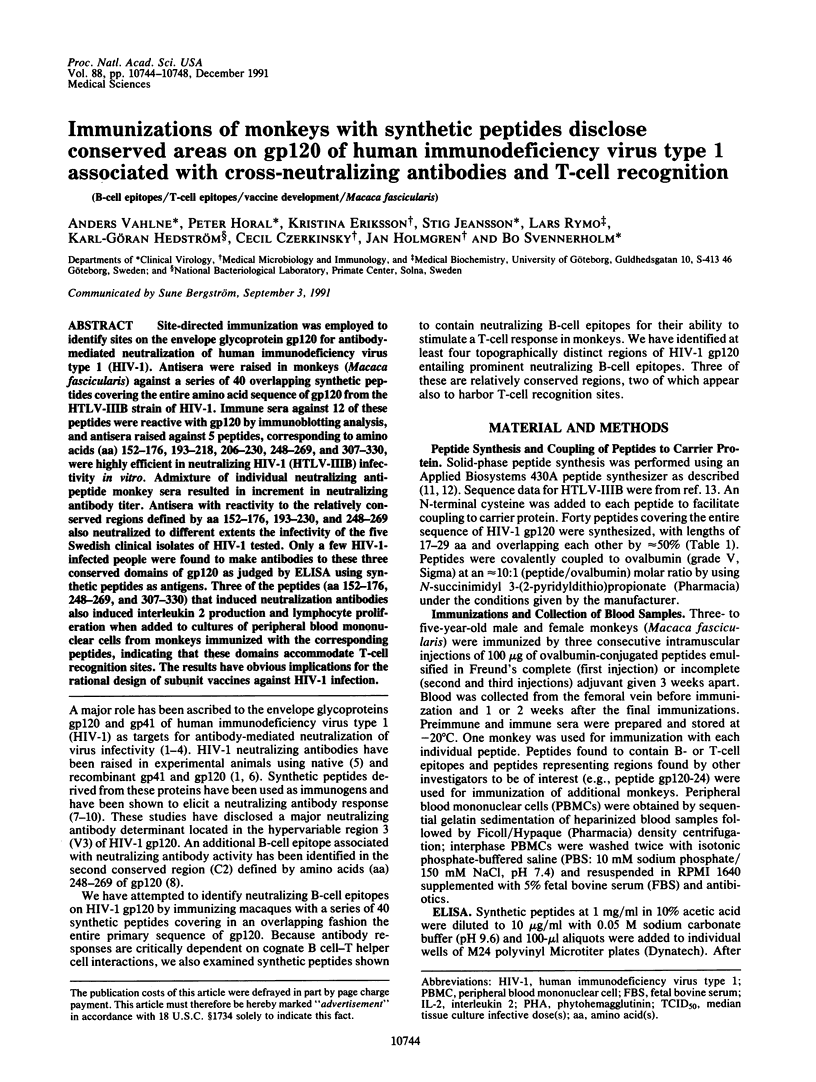
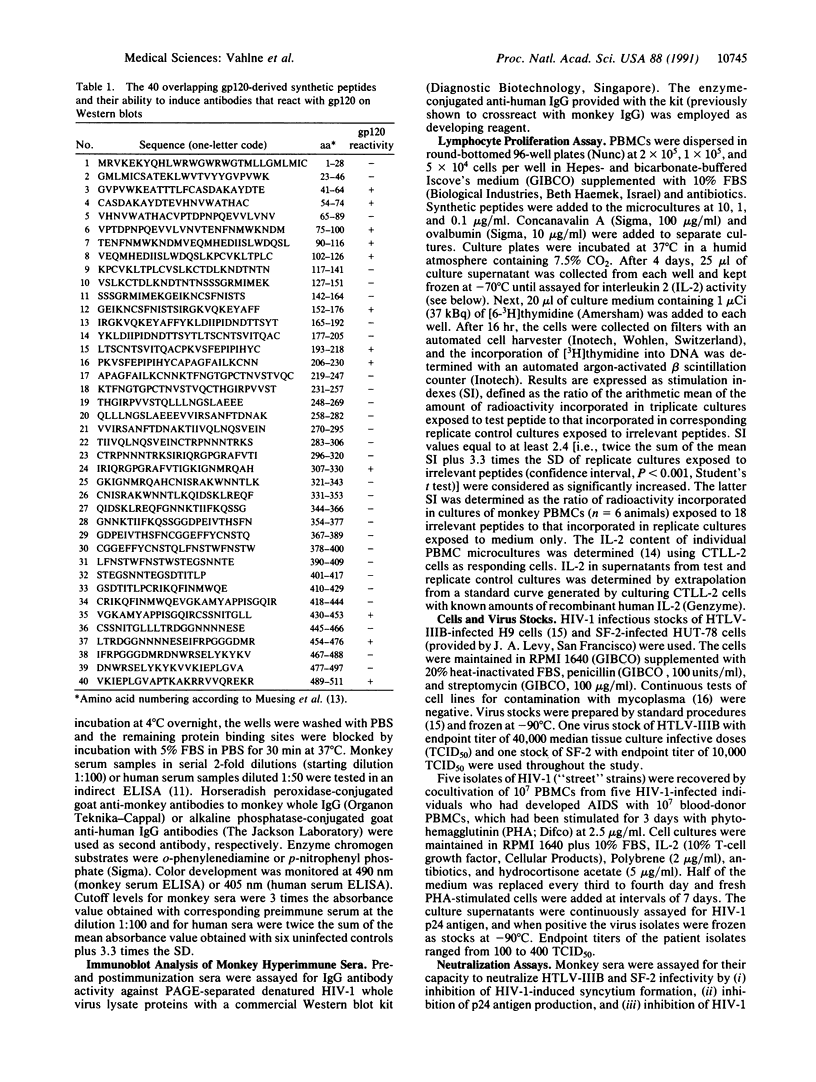
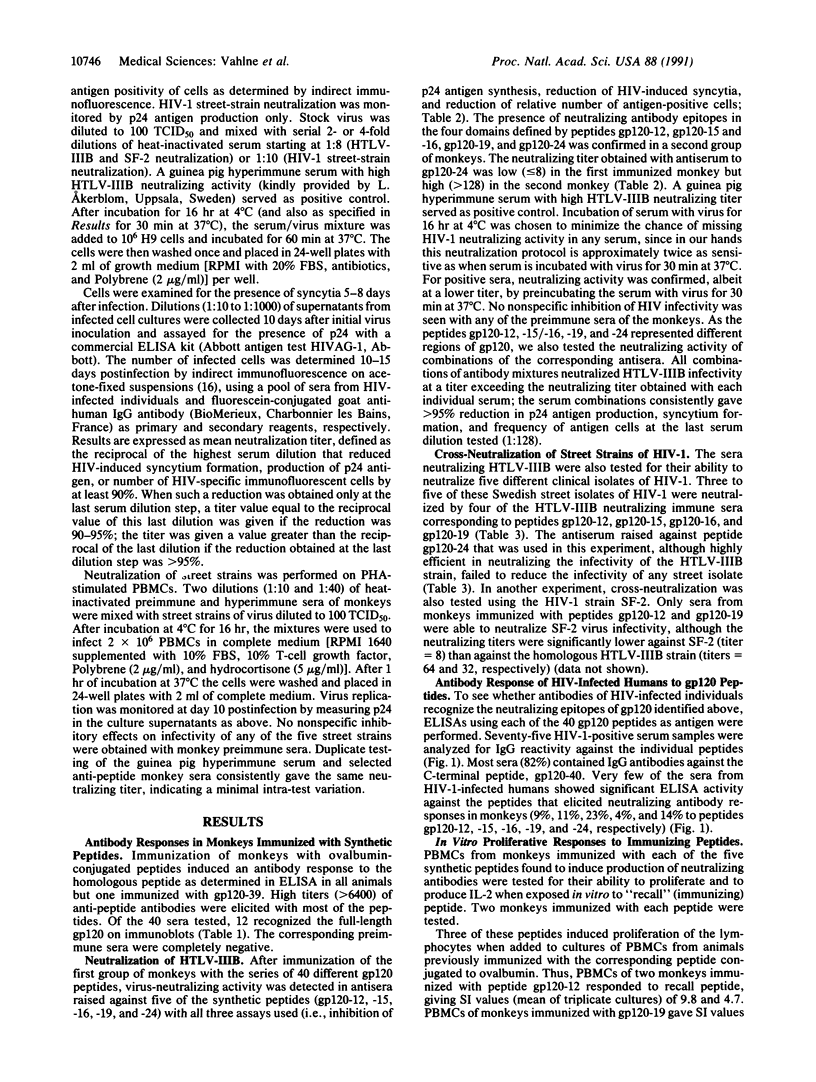
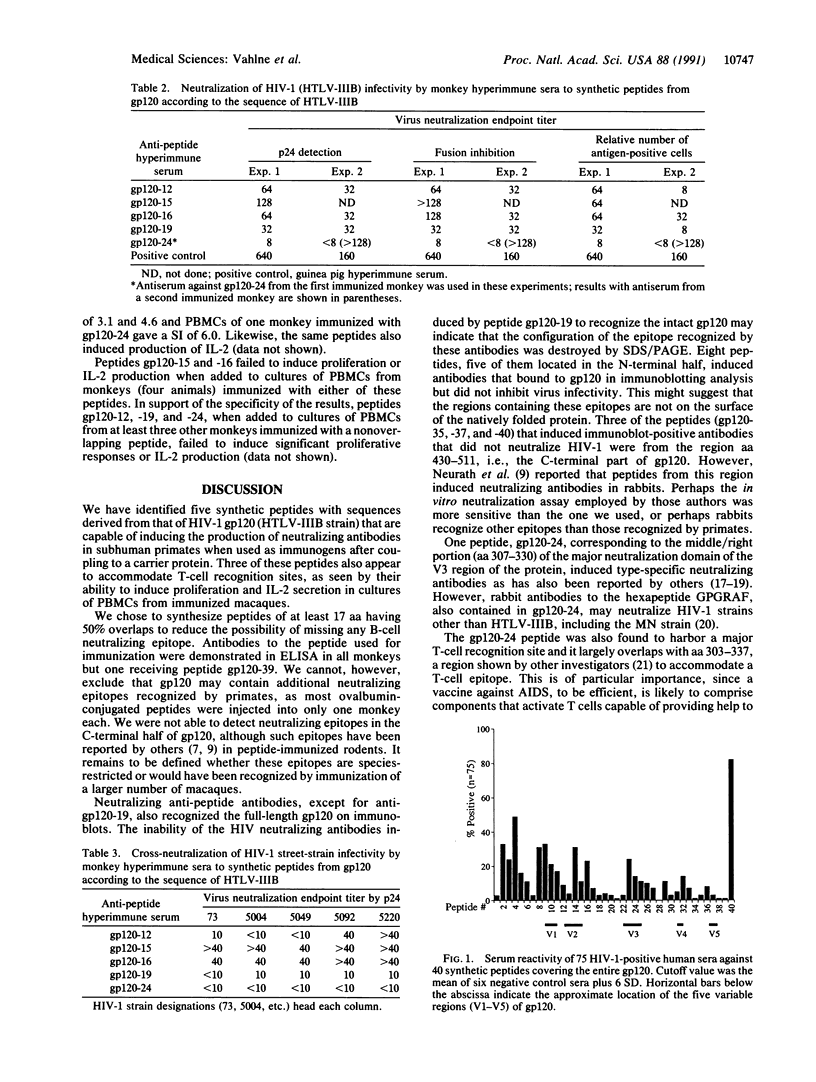
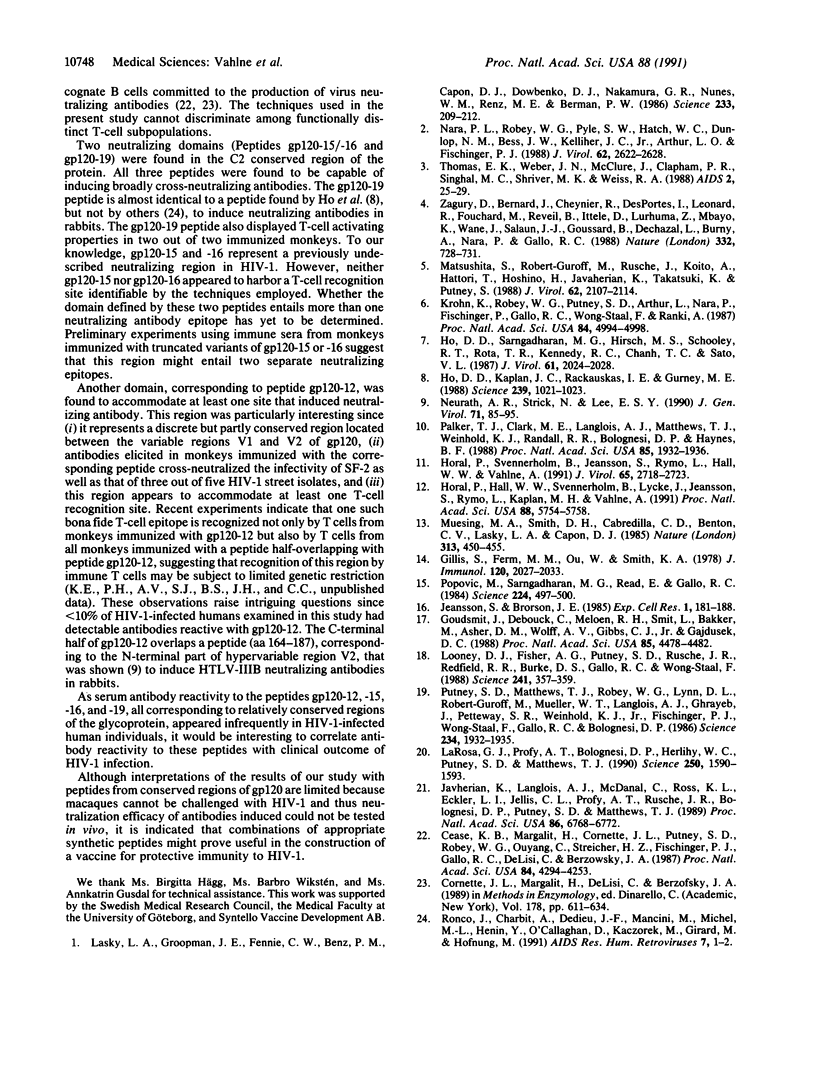
Selected References
These references are in PubMed. This may not be the complete list of references from this article.
- Cease K. B., Margalit H., Cornette J. L., Putney S. D., Robey W. G., Ouyang C., Streicher H. Z., Fischinger P. J., Gallo R. C., DeLisi C. Helper T-cell antigenic site identification in the acquired immunodeficiency syndrome virus gp120 envelope protein and induction of immunity in mice to the native protein using a 16-residue synthetic peptide. Proc Natl Acad Sci U S A. 1987 Jun;84(12):4249–4253. doi: 10.1073/pnas.84.12.4249. [DOI] [PMC free article] [PubMed] [Google Scholar]
- Cornette J. L., Margalit H., DeLisi C., Berzofsky J. A. Identification of T-cell epitopes and use in construction of synthetic vaccines. Methods Enzymol. 1989;178:611–634. doi: 10.1016/0076-6879(89)78042-3. [DOI] [PubMed] [Google Scholar]
- Gillis S., Ferm M. M., Ou W., Smith K. A. T cell growth factor: parameters of production and a quantitative microassay for activity. J Immunol. 1978 Jun;120(6):2027–2032. [PubMed] [Google Scholar]
- Goudsmit J., Debouck C., Meloen R. H., Smit L., Bakker M., Asher D. M., Wolff A. V., Gibbs C. J., Jr, Gajdusek D. C. Human immunodeficiency virus type 1 neutralization epitope with conserved architecture elicits early type-specific antibodies in experimentally infected chimpanzees. Proc Natl Acad Sci U S A. 1988 Jun;85(12):4478–4482. doi: 10.1073/pnas.85.12.4478. [DOI] [PMC free article] [PubMed] [Google Scholar]
- Ho D. D., Kaplan J. C., Rackauskas I. E., Gurney M. E. Second conserved domain of gp120 is important for HIV infectivity and antibody neutralization. Science. 1988 Feb 26;239(4843):1021–1023. doi: 10.1126/science.2830667. [DOI] [PubMed] [Google Scholar]
- Ho D. D., Sarngadharan M. G., Hirsch M. S., Schooley R. T., Rota T. R., Kennedy R. C., Chanh T. C., Sato V. L. Human immunodeficiency virus neutralizing antibodies recognize several conserved domains on the envelope glycoproteins. J Virol. 1987 Jun;61(6):2024–2028. doi: 10.1128/jvi.61.6.2024-2028.1987. [DOI] [PMC free article] [PubMed] [Google Scholar]
- Horal P., Hall W. W., Svennerholm B., Lycke J., Jeansson S., Rymo L., Kaplan M. H., Vahlne A. Identification of type-specific linear epitopes in the glycoproteins gp46 and gp21 of human T-cell leukemia viruses type I and type II using synthetic peptides. Proc Natl Acad Sci U S A. 1991 Jul 1;88(13):5754–5758. doi: 10.1073/pnas.88.13.5754. [DOI] [PMC free article] [PubMed] [Google Scholar]
- Horal P., Svennerholm B., Jeansson S., Rymo L., Hall W. W., Vahlne A. Continuous epitopes of the human immunodeficiency virus type 1 (HIV-1) transmembrane glycoprotein and reactivity of human sera to synthetic peptides representing various HIV-1 isolates. J Virol. 1991 May;65(5):2718–2723. doi: 10.1128/jvi.65.5.2718-2723.1991. [DOI] [PMC free article] [PubMed] [Google Scholar]
- Javaherian K., Langlois A. J., LaRosa G. J., Profy A. T., Bolognesi D. P., Herlihy W. C., Putney S. D., Matthews T. J. Broadly neutralizing antibodies elicited by the hypervariable neutralizing determinant of HIV-1. Science. 1990 Dec 14;250(4987):1590–1593. doi: 10.1126/science.1703322. [DOI] [PubMed] [Google Scholar]
- Javaherian K., Langlois A. J., McDanal C., Ross K. L., Eckler L. I., Jellis C. L., Profy A. T., Rusche J. R., Bolognesi D. P., Putney S. D. Principal neutralizing domain of the human immunodeficiency virus type 1 envelope protein. Proc Natl Acad Sci U S A. 1989 Sep;86(17):6768–6772. doi: 10.1073/pnas.86.17.6768. [DOI] [PMC free article] [PubMed] [Google Scholar]
- Jeansson S., Brorson J. E. Elimination of mycoplasmas from cell cultures utilizing hyperimmune sera. Exp Cell Res. 1985 Nov;161(1):181–188. doi: 10.1016/0014-4827(85)90502-6. [DOI] [PubMed] [Google Scholar]
- Krohn K., Robey W. G., Putney S., Arthur L., Nara P., Fischinger P., Gallo R. C., Wong-Staal F., Ranki A. Specific cellular immune response and neutralizing antibodies in goats immunized with native or recombinant envelope proteins derived from human T-lymphotropic virus type IIIB and in human immunodeficiency virus-infected men. Proc Natl Acad Sci U S A. 1987 Jul;84(14):4994–4998. doi: 10.1073/pnas.84.14.4994. [DOI] [PMC free article] [PubMed] [Google Scholar]
- Lasky L. A., Groopman J. E., Fennie C. W., Benz P. M., Capon D. J., Dowbenko D. J., Nakamura G. R., Nunes W. M., Renz M. E., Berman P. W. Neutralization of the AIDS retrovirus by antibodies to a recombinant envelope glycoprotein. Science. 1986 Jul 11;233(4760):209–212. doi: 10.1126/science.3014647. [DOI] [PubMed] [Google Scholar]
- Looney D. J., Fisher A. G., Putney S. D., Rusche J. R., Redfield R. R., Burke D. S., Gallo R. C., Wong-Staal F. Type-restricted neutralization of molecular clones of human immunodeficiency virus. Science. 1988 Jul 15;241(4863):357–359. doi: 10.1126/science.3388046. [DOI] [PubMed] [Google Scholar]
- Matsushita S., Robert-Guroff M., Rusche J., Koito A., Hattori T., Hoshino H., Javaherian K., Takatsuki K., Putney S. Characterization of a human immunodeficiency virus neutralizing monoclonal antibody and mapping of the neutralizing epitope. J Virol. 1988 Jun;62(6):2107–2114. doi: 10.1128/jvi.62.6.2107-2114.1988. [DOI] [PMC free article] [PubMed] [Google Scholar]
- Muesing M. A., Smith D. H., Cabradilla C. D., Benton C. V., Lasky L. A., Capon D. J. Nucleic acid structure and expression of the human AIDS/lymphadenopathy retrovirus. Nature. 1985 Feb 7;313(6002):450–458. doi: 10.1038/313450a0. [DOI] [PubMed] [Google Scholar]
- Nara P. L., Robey W. G., Pyle S. W., Hatch W. C., Dunlop N. M., Bess J. W., Jr, Kelliher J. C., Arthur L. O., Fischinger P. J. Purified envelope glycoproteins from human immunodeficiency virus type 1 variants induce individual, type-specific neutralizing antibodies. J Virol. 1988 Aug;62(8):2622–2628. doi: 10.1128/jvi.62.8.2622-2628.1988. [DOI] [PMC free article] [PubMed] [Google Scholar]
- Neurath A. R., Strick N., Lee E. S. B cell epitope mapping of human immunodeficiency virus envelope glycoproteins with long (19- to 36-residue) synthetic peptides. J Gen Virol. 1990 Jan;71(Pt 1):85–95. doi: 10.1099/0022-1317-71-1-85. [DOI] [PubMed] [Google Scholar]
- Palker T. J., Clark M. E., Langlois A. J., Matthews T. J., Weinhold K. J., Randall R. R., Bolognesi D. P., Haynes B. F. Type-specific neutralization of the human immunodeficiency virus with antibodies to env-encoded synthetic peptides. Proc Natl Acad Sci U S A. 1988 Mar;85(6):1932–1936. doi: 10.1073/pnas.85.6.1932. [DOI] [PMC free article] [PubMed] [Google Scholar]
- Popovic M., Sarngadharan M. G., Read E., Gallo R. C. Detection, isolation, and continuous production of cytopathic retroviruses (HTLV-III) from patients with AIDS and pre-AIDS. Science. 1984 May 4;224(4648):497–500. doi: 10.1126/science.6200935. [DOI] [PubMed] [Google Scholar]
- Ronco J., Charbit A., Dedieu J. F., Mancini M., Michel M. L., Henin Y., O'Callaghan D., Kaczorek M., Girard M., Hofnung M. Is there a neutralization epitope in the second conserved domain of HIV-1 envelope protein? AIDS Res Hum Retroviruses. 1991 Jan;7(1):1–2. doi: 10.1089/aid.1991.7.1. [DOI] [PubMed] [Google Scholar]
- Thomas E. K., Weber J. N., McClure J., Clapham P. R., Singhal M. C., Shriver M. K., Weiss R. A. Neutralizing monoclonal antibodies to the AIDS virus. AIDS. 1988 Feb;2(1):25–29. doi: 10.1097/00002030-198802000-00004. [DOI] [PubMed] [Google Scholar]
- Zagury D., Bernard J., Cheynier R., Desportes I., Leonard R., Fouchard M., Reveil B., Ittele D., Lurhuma Z., Mbayo K. A group specific anamnestic immune reaction against HIV-1 induced by a candidate vaccine against AIDS. Nature. 1988 Apr 21;332(6166):728–731. doi: 10.1038/332728a0. [DOI] [PubMed] [Google Scholar]


